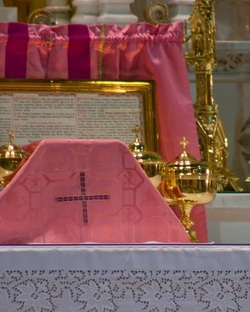
This morning you will notice I’ve taken the liberty to strew our white marble altar with pink flowers—camelias from the tree in front of Loyola Hall. For today is Laetare Sunday, the one Sunday in Lent on which instrumental music is permitted and flowers may adorn the altar. Your priests and your altars bear rose vesture today, signifying the joy proper to those who can see Easter on the horizon. The Mass Collect today articulates our hope: “with prompt devotion and eager faith may we hasten toward the solemn celebrations to come.”
The Father’s Prodigal Love
On Laetare Sunday, Holy Mother Church spreads the feast of Christ’s greatest parable before us, that of the so-called Prodigal Son. Its vast panorama portrays three characters: the younger son, the older son, and the Father. It is the parable of the Prodigal Father, Rich in Mercy. So Blessed John Paul II named his second encyclical, Dives inMisericordia, on God the Father, which often refers to this parable. It never fails to console him who reads it prayerfully. More than any other, the parable of the Prodigal Son convinces us of God’s tender and undying love for his sons and daughters.
Let us weep: I have lost my son
First, consider the younger son: “Father, give me the share of your estate that should come to me.” In a shocking act of non-negotiable, in-your-face self-centeredness, he demands from his father half of the family business in cash so that he can waste it in a distant land—perhaps Las Vegas or Miami. We might miss the outrage in his words—“I can’t wait for you to die, old man: give me your money now”—but imagine how it sounded to Jesus’ hearers, who held their fathers in great reverence. The son leaves his father’s home for a “distant country,” which as Fr. Barron points out renders the Greek choran makran, which may be translated “vast region.” The lost son enters the empty lands of his own self-absorption, the vast barren regions where demons abide. He is truly the Lost Son.
Let us rejoice: I have found my son
Eventually, the Lost Son hits bottom, returns to his senses, and resolves to turn back to his father’s house. “While he was still a long way off, his father caught sight of him.” The Father scans the horizon day after day, longing for his son, but refusing to force him. He detects only a glimmer in his son, a small speck on a distant horizon, slowly moving closer. He does not wait, but tucks up his noble robes and runs, not walks, but runs to his son. And all is forgiven. The Father does not even wait for his son to finish his confession: your sins do not matter now. All that matters is that I have you back, safe and sound. You have returned to me.
God is always watching us, waiting for our next move. Thoughtlessly, we fear he watches our every move in order to condemn, waiting with baited breath to accuse us. But this image is not Scriptural. Jesus, in his greatest parable, portrays a Father, rich in mercy, relenting in punishment, always ready to forgive. In the Bible, it is Satan who accuses. The Son and the Holy Spirit defend, not accuse, against Satan’s accusations. “I have come not to condemn, but to save what was lost.”
So the Lord says to Joshua in our First Reading, “Today I have removed the reproach of Egypt from you;” So St. Paul says in our Second Reading, you are a “new creation: God has reconciled us to himself through Christ,… not counting our trespasses against us.” The ring, the finest robe, the fattened calf—all this is ours, if we return to our Father’s house. We can only do that through the grace of Christ.Therefore, Paul concludes, “we implore you: be reconciled to God.”
Three more weeks of Lent
Three more weeks of Lent, and the great liturgies of the Sacred Triduum, open up before us. There is no more propitious time in the year to be reconciled to God. Change bad habits, make a good confession, return to the Word and the Sacraments with your whole hearts, in fasting, weeping, and praying. Return to your father’s house. He will not refuse you. He will run to greet you, with open arms, for my Son, he says, “was lost, and is found. He was dead, and has come back to life again.”


 RSS Feed
RSS Feed